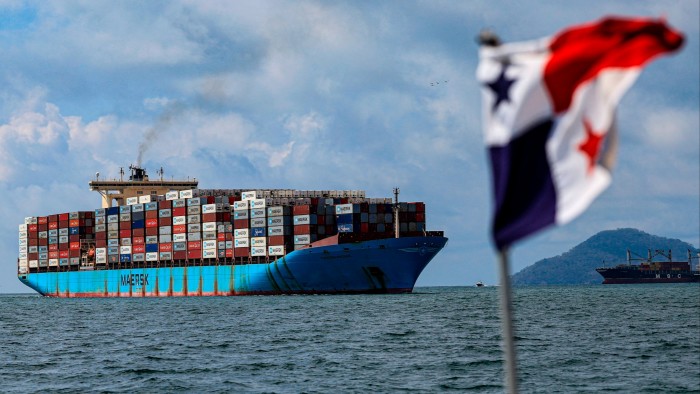Unlock the Editor’s Digest for free
Roula Khalaf, Editor of the FT, selects her favourite stories in this weekly newsletter.
Countries representing most of the world’s shipping fleet have backed a flat tax on every tonne of the industry’s greenhouse gas emissions, boosting the chances that all shipowners will soon have to pay for polluting.
Liberia and Panama, home to the world’s two most important shipping registries, have thrown their weight behind the proposed levy on shipowners, joining 43 other jurisdictions, including EU countries, according to a written proposal to the UN’s International Maritime Organization.
The proposal, completed last month, means the tax will now have the support of countries that register merchant ships with a collective capacity of 1.6bn deadweight tonnes, 66 per cent of the global total, according to UN data.
The joint statement by some of the biggest forces in shipping, including leading ship-owning nations Japan and Greece, highlights the diplomatic weight lining up behind an emissions levy for an industry that remains almost entirely dependent on fossil fuels.
“It is really significant [that Liberia and Panama have backed the levy],” said one delegate involved in IMO negotiations, adding that without the support of the largest shipping registries, “it is a bit like the [UK] House of Parliament liking something and the House of Lords not liking it, and [the policy] getting dismantled by one entity while being pushed by another.”
The delegate pointed out that while neither country has greater voting power, they do hold an outsized role in financing the IMO and running its executive council.
A flat fee on every tonne of shipping emissions has been opposed by other powerful shipowning nations and exporters, including China and Brazil, along with the US.
The signatories also remain far from agreeing the details of the tax, including the exact cost that shipowners should pay for every tonne of their emissions. Liberia has backed a fee of just $18.75, while the Marshall Islands, the third most important registry, wants to impose a levy of almost 10 times that at $150 a tonne.
A flat tax on emissions has long been pushed by the EU and Pacific island states that are especially exposed to climate change, although there is also disagreement on how widely the money generated should be used.
The letter to the IMO states that the signatories “strongly believe that the economic element of the basket of midterm measures [for decarbonisation] should have at its heart a levy/contribution on the [greenhouse gas] emissions from ships”.
The letter said such a tax “will stimulate energy efficiency, reduce the price gap between fossil fuels and zero-near zero (ZNZ) [greenhouse gas] fuels, as well as generate revenues to support uptake of ZNZ fuels, technologies and energy sources”.
The annual levy would be imposed based on CO₂ emissions “emitted on a life cycle basis”.
The proposal also recommended using the funds generated to reward ships using low-emission fuels, which could include green methanol or ammonia.
It presented the option of using these funds to help poorer countries with the costs of the levy and the clean energy transition generally. But it also suggested distributions could be more limited to decarbonising shipping.
Low taxes have helped draw a third of the global shipping fleet by volume to register in Liberia and Panama, which are responsible for ensuring these vessels comply with international rules agreed at the IMO.
Alternatives have been suggested since IMO member states agreed in 2023 that an economic measure should be set to achieve a target of net zero shipping emissions “by or around” 2050. They face a deadline of 2026 to set such a measure.
These include a trading scheme that would see more polluting shipowners buy credits from less polluting peers, which delegates said the US, China and Brazil have supported.
Tristan Smith, an energy and shipping researcher at University College London, warned that a $18.75 levy would be insufficient even if it was imposed on every tonne of emissions.
“You don’t get an energy transition without” a levy of between $100 and $150, in combination with a financial reward for zero-emission ships, he said.
But Atina Schutz, negotiator for the Marshall Islands, one of the island states particularly concerned by rising sea levels, said: “We are grateful for the spirit of collaboration [and] welcome the additional support.”
She added: “With this text as a basis, we can ensure that the IMO delivers on the ambitious climate targets we agreed on in July 2023.”
Read the full article here

